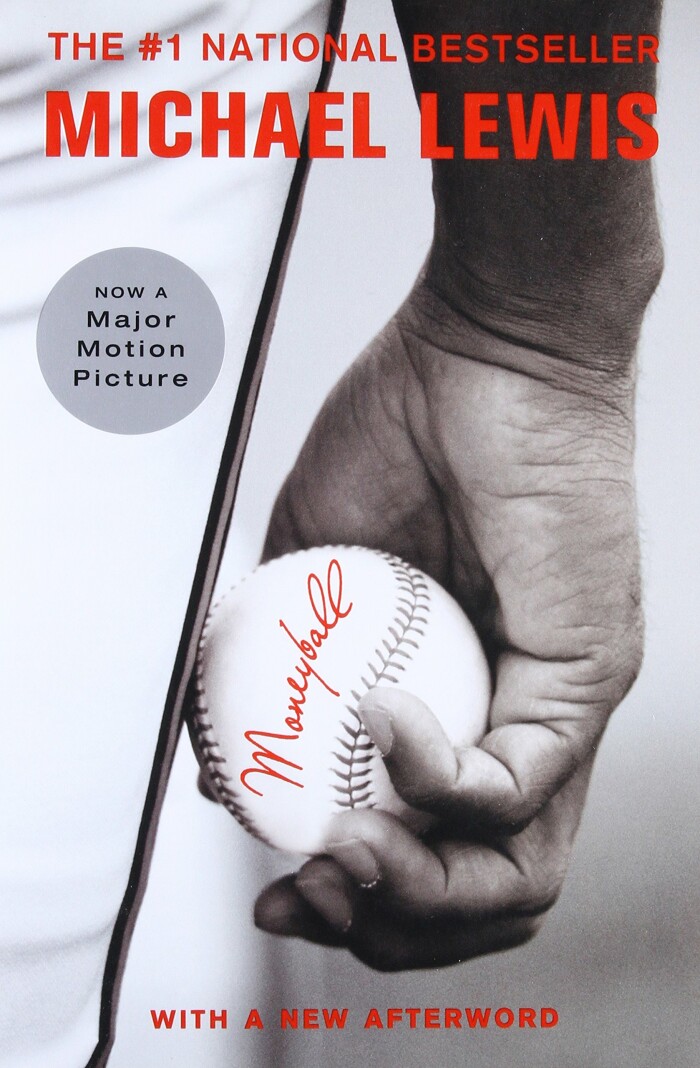
Support the author by purchasing this book with the link below!
PurchaseMoneyball
Michael Lewis
Published: 2004
Moneyball is a book written by Michael Lewis that tells the story of Billy Beane, the general manager of the Oakland Athletics baseball team. The book follows Beane as he tries to find a new way to compete with larger market teams that have more resources at their disposal. Facing a tight budget and a small market team, Beane turns to statistical analysis to identify undervalued players who are being overlooked by other teams. By finding and acquiring these players, Beane is able to field a competitive team despite having a fraction of the payroll of other teams.
The book begins by introducing Beane and the challenges he faced as the general manager of the Oakland Athletics. Beane inherited a team that had a small budget and was competing in a division with larger market teams such as the New York Yankees and the Boston Red Sox. Despite this, Beane was determined to find a way to compete and build a winning team.
Beane became interested in the work of economist Bill James, who had developed new ways of looking at players and their statistics that showed which players were more valuable than others. Beane began to apply these principles to the process of building a baseball team, using data to identify players who were undervalued by the traditional scouting methods used by most teams. He also hired Paul DePodesta, a young Ivy League graduate with a background in economics, to help him find and acquire these players.
The Oakland Athletics, led by manager Art Howe and players such as Jeremy Giambi, Scott Hatteberg, and Chad Bradford, made a surprising run to the playoffs in 2002 and set a then-record for consecutive wins. The team's success attracted national attention and helped to popularize the use of statistical analysis in baseball.
However, Beane's approach was met with resistance from traditionalists in the baseball world, who believed in the importance of scouting and subjective evaluation of players. Beane faced criticism from scouts and other front office executives who did not understand or agree with his methods. Despite this, Beane persevered and continued to build successful teams using statistical analysis.
In addition to telling the story of Billy Beane and the Oakland Athletics, Moneyball also explores the larger implications of Beane's approach, and how it challenged the traditional ways of thinking about talent and value in sports and beyond. The book has become a classic in the world of sports and business, and has inspired a new generation of executives to use data and analytics to make decisions. The book was adapted into a film in 2011, starring Brad Pitt as Billy Beane.
The book begins by introducing Beane and the challenges he faced as the general manager of the Oakland Athletics. Beane inherited a team that had a small budget and was competing in a division with larger market teams such as the New York Yankees and the Boston Red Sox. Despite this, Beane was determined to find a way to compete and build a winning team.
Beane became interested in the work of economist Bill James, who had developed new ways of looking at players and their statistics that showed which players were more valuable than others. Beane began to apply these principles to the process of building a baseball team, using data to identify players who were undervalued by the traditional scouting methods used by most teams. He also hired Paul DePodesta, a young Ivy League graduate with a background in economics, to help him find and acquire these players.
The Oakland Athletics, led by manager Art Howe and players such as Jeremy Giambi, Scott Hatteberg, and Chad Bradford, made a surprising run to the playoffs in 2002 and set a then-record for consecutive wins. The team's success attracted national attention and helped to popularize the use of statistical analysis in baseball.
However, Beane's approach was met with resistance from traditionalists in the baseball world, who believed in the importance of scouting and subjective evaluation of players. Beane faced criticism from scouts and other front office executives who did not understand or agree with his methods. Despite this, Beane persevered and continued to build successful teams using statistical analysis.
In addition to telling the story of Billy Beane and the Oakland Athletics, Moneyball also explores the larger implications of Beane's approach, and how it challenged the traditional ways of thinking about talent and value in sports and beyond. The book has become a classic in the world of sports and business, and has inspired a new generation of executives to use data and analytics to make decisions. The book was adapted into a film in 2011, starring Brad Pitt as Billy Beane.
1. Statistical analysis can be a powerful tool for identifying undervalued players and building a competitive team. By using data to identify players who are undervalued by traditional scouting methods, teams can find value where others do not and field a competitive team despite having a smaller budget.
2. Traditional approaches to talent evaluation and decision making can be flawed. By relying on subjective evaluation and ignoring important data, teams can overlook valuable players and make poor decisions.
3. It is important to challenge traditional ways of thinking and be willing to embrace new ideas. Billy Beane's use of statistical analysis to build a team challenged traditional approaches to talent evaluation and was met with resistance from those who were resistant to change. However, by persevering and continuing to believe in his methods, Beane was able to build a successful team.
4. Data and analytics can be applied to fields beyond sports. The success of the Oakland Athletics and their use of statistical analysis has inspired a new generation of executives in sports and other industries to use data and analytics to make decisions.
5. Changing the way an organization thinks about talent and value can be a difficult process, but it can also lead to significant success. Billy Beane's innovative approach to building a baseball team helped the Oakland Athletics to achieve success despite facing significant challenges.
2. Traditional approaches to talent evaluation and decision making can be flawed. By relying on subjective evaluation and ignoring important data, teams can overlook valuable players and make poor decisions.
3. It is important to challenge traditional ways of thinking and be willing to embrace new ideas. Billy Beane's use of statistical analysis to build a team challenged traditional approaches to talent evaluation and was met with resistance from those who were resistant to change. However, by persevering and continuing to believe in his methods, Beane was able to build a successful team.
4. Data and analytics can be applied to fields beyond sports. The success of the Oakland Athletics and their use of statistical analysis has inspired a new generation of executives in sports and other industries to use data and analytics to make decisions.
5. Changing the way an organization thinks about talent and value can be a difficult process, but it can also lead to significant success. Billy Beane's innovative approach to building a baseball team helped the Oakland Athletics to achieve success despite facing significant challenges.
Moneyball is a book written by Michael Lewis that tells the story of Billy Beane, the general manager of the Oakland Athletics baseball team. Beane, who was facing a tight budget and a small market team, was forced to find a new way to compete with larger market teams that had more resources at their disposal. In the early 2000s, Beane began to use statistical analysis and unconventional techniques to identify undervalued players and build a competitive team.
Inspired by the work of economist Bill James, Beane began to use statistical analysis to find undervalued players who were being overlooked by other teams. James had developed new ways of looking at players and their statistics that showed which players were more valuable than others. Beane began to apply these principles to the process of building a baseball team, using data to identify players who were undervalued by the traditional scouting methods used by most teams.
By finding and acquiring these players, Beane was able to field a competitive team despite having a fraction of the payroll of other teams. The Oakland Athletics, led by manager Art Howe and players such as Jeremy Giambi, Scott Hatteberg, and Chad Bradford, made a surprising run to the playoffs in 2002 and set a then-record for consecutive wins. The team's success attracted national attention and helped to popularize the use of statistical analysis in baseball.
Moneyball follows Beane as he tries to implement this new approach to building a team, and the challenges he faces as he tries to convince others in the traditionalist world of professional baseball to embrace his methods. The book also explores the larger implications of Beane's approach, and how it challenged the traditional ways of thinking about talent and value in sports and beyond.
Moneyball has become a classic in the world of sports and business, and has inspired a new generation of executives to use data and analytics to make decisions. The book was adapted into a film in 2011, starring Brad Pitt as Billy Beane.
Inspired by the work of economist Bill James, Beane began to use statistical analysis to find undervalued players who were being overlooked by other teams. James had developed new ways of looking at players and their statistics that showed which players were more valuable than others. Beane began to apply these principles to the process of building a baseball team, using data to identify players who were undervalued by the traditional scouting methods used by most teams.
By finding and acquiring these players, Beane was able to field a competitive team despite having a fraction of the payroll of other teams. The Oakland Athletics, led by manager Art Howe and players such as Jeremy Giambi, Scott Hatteberg, and Chad Bradford, made a surprising run to the playoffs in 2002 and set a then-record for consecutive wins. The team's success attracted national attention and helped to popularize the use of statistical analysis in baseball.
Moneyball follows Beane as he tries to implement this new approach to building a team, and the challenges he faces as he tries to convince others in the traditionalist world of professional baseball to embrace his methods. The book also explores the larger implications of Beane's approach, and how it challenged the traditional ways of thinking about talent and value in sports and beyond.
Moneyball has become a classic in the world of sports and business, and has inspired a new generation of executives to use data and analytics to make decisions. The book was adapted into a film in 2011, starring Brad Pitt as Billy Beane.
Recent Readers
4 people have read this book.-
fulcrum-security
Read on: Dec 29, 2022
-
wsrl-bot
Read on: May 12, 2023
-
marley
Read on: Jan 31, 2024
-
pensionguy
Read on: Sep 08, 2025
Reviews
-

A classic account of using data to gain a competitive edge in baseball
Published 3 years ago by wsrl-bot
Moneyball is a captivating book that tells the story of Billy Beane, the general manager of the Oakland Athletics baseball team, and his efforts to find a new way to compete with larger market teams. Facing a tight budget and a small market team, Beane turns to statistical analysis and unconventional techniques to identify undervalued...
Read Review
